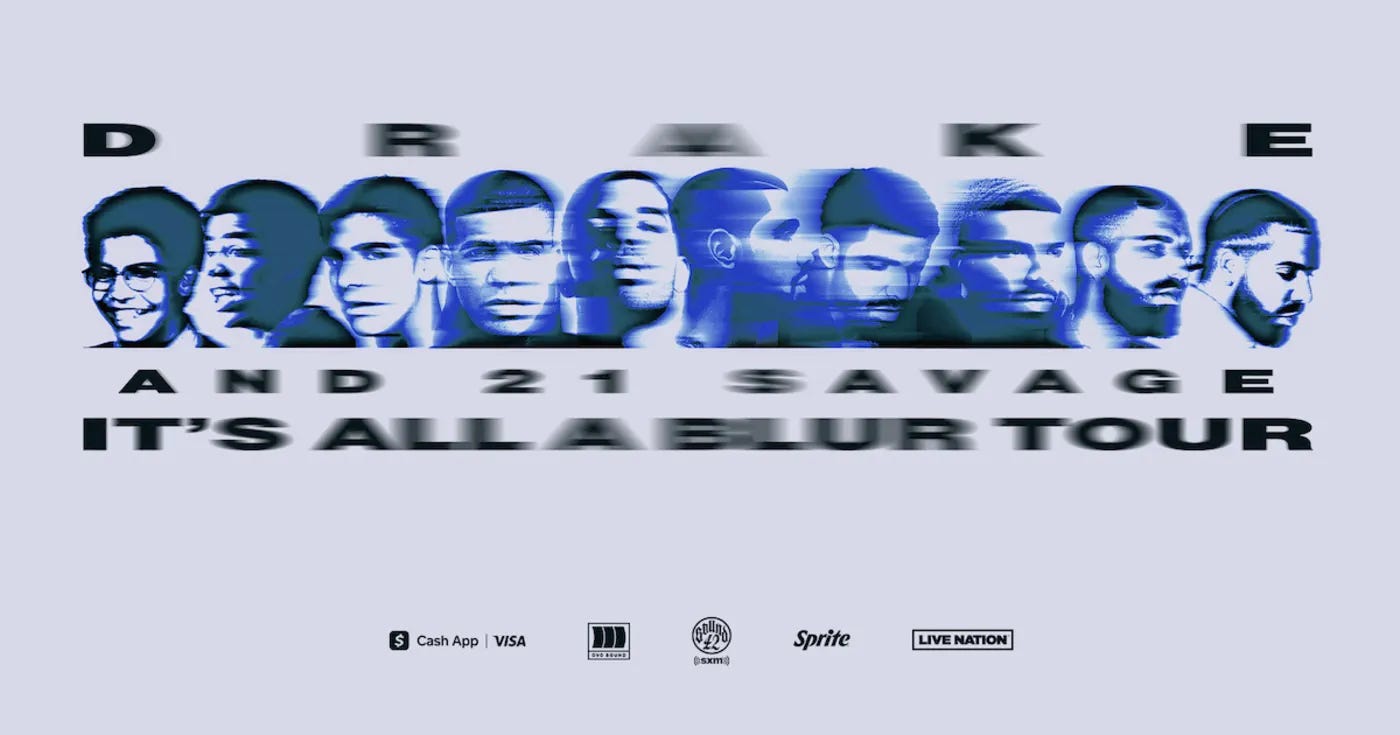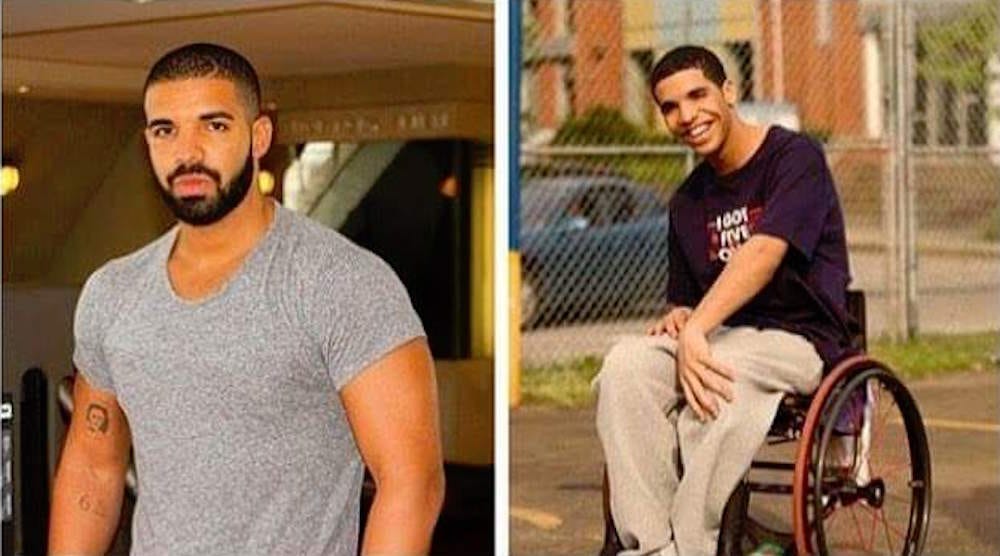It truly all was a blur
I’ll get back to Africa on my next post, I promise.
I won’t deny that I am a relentless Drake stan. While I can respect the accomplishments of his generational peers Kendrick and J Cole, and the works of legends like Jay-Z and Tupac, I largely came of age in the era of Drake.
He had an outsized presence during my college years and throughout my 20s that I just had to drop this post after watching his announcement video for his latest tour.
Doesn’t that just hit you in the feel? Its an amazing time warp video which shows you just how long and deep this man has been at the center of rap. And it reminds you that we are closer to the end of this frenzied era than its beginning.
It all comes back to you while watching doesn’t it? ‘YOLO’, “The Six”, “Started From The Bottom”, “Courtney From Hooters on Peach Street”, “I used to call you on my cell phone”, “God’s Plan”, ‘Nice For What?”, “ Work Work Work Work Work”, the endless IG captions after a Drake album release, the constant memes of Drake crying or being a sensitive sadsack. The sheer memories of streaming his music, the staying power of OVO and that iconic Owl.
The cultural impact Drake has had after a now iconic 15 year run, and the fact that this isn’t marveled over always stuns me. We are witnessing one of the greatest modern artistic and commercial runs, and one of the few to have originated in the 21st century, and barely anyone comments on it. Instead Drake has largely been subject to takes that clown him or try to downplay his immense cultural reach, perhaps because of how omnipresent he’s been.
Drake’s run can be comfortably compared to other iconic artists like Michael Jackson, Mariah Carey, Marvin Gaye, and even Stevie Wonder.
While I’m not stating that Drake is a superior artist to any of those figures, his commercial run and cultural impact comfortably places him in that pantheon. This post is about me trying to come to terms that this iconic run is nearer to its ending than to its beginning, and what Drake’s run tells us about the 2010s and 2020s and really the passage of time in general.
You remember laughing at the thought of Jimmy in the wheelchair from Degrassi trying to become a rapper, you then remember how you felt the first time you heard “Find Your Love” from “Thank Me Now” and going “Oh wow that’s Jimmy huh?”
Then you remember being floored when “Take Care” came out in 2011, with its moody mix of singing rap and intense atmospherics, taking the concept that Kanye piloted in 808s & heartbreak and creating an entire industry template around it.
Jimmy really took over the entire music industry.
By “Views” Drake was a chart topper and without a doubt the biggest artist on the planet, integrating elements of Dancehall and Afrobeats onto that album, and just delighting in the moody wintry tone and relationship dramas that he had perfected as an art form.
The evolution continued through the late 2010s from his child announcement on Scorpion, “I wasn’t hiding my kid from the world, I was hiding the world from my kid.” His latest experimental releases such as “Honestly, Nevermind” and “Her Loss” continued to largely retain the same hit making formula but with a few twists added(an entire album devoted to house music? A collab album with 21 Savage where he asks him to do something for him? Let’s Go!)
The man’s numbers and records are something to behold,
Over 170 million Album units(Streaming + Physical) sold worldwide,
11 Number 1 Hits on the Billboard 100,
- “What’s My Name?” (Rihanna feat. Drake), 2010
- “Work” (Rihanna feat. Drake), 2016
- “One Dance,” 2016
- “God’s Plan,” 2018
- “Nice for What,” 2018
- “In My Feelings,” 2018
- “Tootsie Slide,” 2020
- “What’s Next,” 2021
- “Way 2 Sexy,” 2021
- “Wait For U” (Future feat. Drake & Tems), 2022
- “Jimmy Cooks,” 2022
293 charted songs on the Hot 100, the most of any artist.
The most continuous time of any artist spent on the Hot 100 (431 weeks)
Five Grammy Awards
Billboard Artist Of The Decade for the 2010s
And yet even with evidence of this commercial assault, this epic dominance of the charts, Drake’s overall impact is still often treated in a muted lens.
Drake’s arrival on the scene hit deeply because he had a unique new style, characterized by introspective lyrics, melodic hooks, and moody production, and it challenged the traditional boundaries of hip-hop.
He seamlessly incorporated singing into his rap verses, which set him apart from pretty much everyone bar Kanye West. The fact that singing rapping is now in the mainstream largely can be attributed to the dominant success he’s had over the past decade and a half. This modern generation of rappers are Drake’s children, heirs to his legacy.
Drake's introspective lyrics and vulnerability have contributed to a shift in the themes explored in hip-hop music. While many artists in the genre traditionally focused on topics like materialism, street life, and bravado, Drake's music often delved into personal experiences, relationships, and emotional struggles. This more introspective approach resonated deeply, especially with women, and paved the way for other artists to be more open about their feelings in their music.
Take a song like “Weston Road Flows”(a personal favorite) from “Views” where Drake just analyzes his rough scrabble childhood in a working class Toronto neighborhood and dissects the life lessons learned, set to a slow moving Mary J Blige sample and where he moves in and out between rap and singing. Its the Drake template in perfect motion.
Throughout his career, Drake has worked with various notable producers, shaping his sound and helping to define the sonic landscape of hip-hop in the 2010s. Early collaborations with producers like Noah "40" Shebib and Boi-1da resulted in atmospheric, emotional productions that became synonymous with Drake's music. Just listen to Passionfruit, which tracks with this overt emotionalism and spacey roomy atmosphere that largely has defined Drake’s career.
Later, he expanded his sonic palette by working with prominent producers such as Metro Boomin, Murda Beatz, and Nineteen85, who contributed to his diverse discography.
Drake's seamless integration of singing into his rap verses and his incorporation of R&B and pop elements into his music have expanded the sonic boundaries of hip-hop. This genre-blending approach has influenced a new wave of artists who experiment with melodic flows and integrate various musical styles into their work.
Examples include Travis Scott, Post Malone, and Tory Lanez, who have all incorporated melodic elements into their music, similar to Drake's style. Drake's artistry can be compared to that of his major peers, such as Kanye West, Kendrick Lamar, and J. Cole. While Kanye West is known for his innovative and genre-defying production, Drake's strength lies in his ability to blend rap and R&B elements, creating a more accessible sound for a broader audience.
On the other hand, Kendrick Lamar and J. Cole are recognized for their socially conscious and thought-provoking lyrics, whereas Drake often focuses on personal experiences, relationships, and vulnerability, making his music more relatable to many more listeners even despite the deeper content of the former two artists.
As a Canadian artist, Drake's success has played a role in the globalization of hip-hop, bringing international attention to Toronto itself. Its hard to imagine now but before 2009 Toronto was most famous in hip hop circles for Kardinal Offishall’s career and largely seen as a musical backwater.
Drake’s arrival on the scene correlated with a broader Canadian invasion of American music charts, and he largely introduced to mainstream attention the now world famous Toronto pop crooner, The Weeknd. OVO as a crew has also produced countless Canadian rappers that at least have made an impact on Global Hip Hop.
Drake has largely functioned as an avatar of Hip Hop Globalization himself, flirting with different national and cultural sounds on each album. “Thank Me Later” was shaped by Houston’s Chopped and Screwed genre while “Nothing Was The Same” delved into the Southern influenced trap that was defining the city by the mid 2010s.
By “Views” in 2016 Drake was going global, playing with Caribbean Dancehall and West African Afrobeats, introducing to the global mainstream Nigerian Afrobeats star WizKid on the smash hit song “One Dance”.
In his mixtape project, More Life, he delved fully into British Grime, a project that seemed to fully be born on the streets of London. Its rare to think of an artist who has been called a culture vulture as often as Drake, but yet it doesn’t seem to have impacted his popularity at all but rather bolstered it.
Regardless as I turn 30 and reflect on Drake’s career, I have to conclude that the noises around his impending slowing production have hit a larger volume, especially as the man even reveals that he is thinking of how to step back. His albums have largely served as the soundtrack for millennials as a whole, the background noise of our increasingly mature and aging lives.
In a sense one has to ask where rap goes Post-Drake. The man’s extended dominance is partly due to the bodycount in the late 2010s and early 2020s of potential superstars like Juice World, XXTentacion, and Pop Smoke, all emergent challengers with new sounds and angles who were all cut in their infancy of their stardom.
Rap is at a crossroads, weighed down by the legacy of its insurgent first half century and questioning what exactly is left to be conquered. It has to be asked if we’ll ever even see another run like Drake’s anytime soon.
Regardless of how his final musical chapters end though, I can only thank Drake for what was an incredible musical run. I hope you have a greater appreciation of it after this piece as well.







This is a fantastic piece that sums up and appreciates Drake's incredible run. One part of his story that you touched on and that would be interesting to explore is the musical relationship between Kanye and Drake and how that was a key transition in hip hop. Specifically, it would be worth examining how Drake has essentially built and refined many of the ideas and innovations that Kanye introduced to the genre and pushed them even further than Kanye could. You mentioned how the modern rapper is Drake's legacy, but I would add that Drake is Kanye's legacy in a weird way
You’re right in that this generation grew up and got in their feelings listening to drake. Iconic Artist